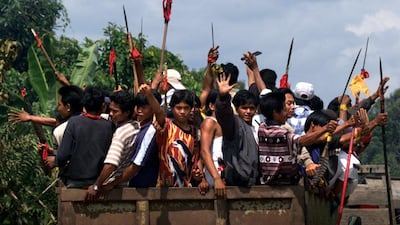JAKARTA // Indonesia’s Islamic extremists are playing with fire in trying to establish a foothold in West Kalimantan on the island of Borneo, homeland of the headhunting Dayak people who massacred hundreds of Muslim settlers in an outbreak of communal violence in the late 1990s.
Late last month, reacting to the two-year jail term handed down to deposed Christian Jakarta governor Basuki Purnama for alleged blasphemy, the non-Muslim Dayaks forced two leaders of the hardline Islamic Defenders Front (FPI) to return to Jakarta shortly after they arrived in Pontianak, capital of the West Kalimantan province.
The FPI has also tried to establish a branch in neighbouring Central Kalimantan, where the Dayaks prevented its members from leaving their plane in February 2012, saying their presence was not conducive to religious harmony.
Police and military stepped up street patrols to calm the latest upsurge in tensions after West Kalimantan’s Catholic governor, Cornelis MH, warned he would expel FPI head Rizieq Shihab if he made any attempt to visit the province.
Mr Shihab will not be testing that warning for a while. Wanted by police on hate speech and pornography charges, he has refused to return home from the Haj, flying from Saudi Arabia to Malaysia and then back again when it became clear he would be arrested on arrival in Jakarta.
His lawyers claim the charges are revenge for the leading role the 50-year-old firebrand played in pushing the blasphemy case against Mr Purnama which ended in his resounding defeat in the April 19 gubernatorial election.
West and Central Kalimantan are two of the four provinces in the Indonesian half of Borneo and home to more than 2.5 million mostly Christian Dayaks out of a total population of 6.8 million.
While they are the majority ethnic group in West Kalimantan, the combined Muslim population – comprising Malays, Madurese and Javanese – still outnumber Christians by 51 to 36 per cent.
West Kalimantan is a serious worry because of the potential for re-igniting the violence which erupted there between 1996 and 1997 when the Dayaks killed as many as 1,000 Madurese migrants in Indonesia’s worst blood-letting since the 1960s.
With the police and military unable to protect them, more than 75,000 rural Madurese were forced to flee for their lives and resettle along the coast, where most remain today.
The Madurese come from an island of the same name off the east coast of Java, Indonesia’s most populous island, first migrating to West Kalimantan in the early 1900s to work in Dutch colonial-era rubber plantations.
The 1996-97 bloodshed erupted after several incidents, including the murder of four Dayak teenagers who were dragged off a bus by a Madurese mob before being hacked to death, and an unprovoked attack on a Dayak girls’ boarding school in which pupils were physically assaulted.
Slow to be aroused, the Dayaks went on the rampage once the mangkok merah, a “red bowl” smeared with chicken blood, began to be passed from village to village, the traditional method of declaring war.
In the ritualistic mayhem that followed, Dayak raiding parties burnt villages and beheaded many of their victims, leaving the heads on roadside stakes, drinking their blood and in some cases eating their livers and hearts.
The three months of terror stemmed from long-standing enmity between the ethnic groups, involving land disputes and Dayak complaints about the Madurese being too quick to anger and too quick to pull a knife.
Religion was not the major issue in West Kalimantan then, but the arrival of four Muslim clerics during the bloodshed did exacerbate tensions, with rumours circulating that they were there to start a holy war. The fallout from the Purnama case means religion could now become much more of a trigger, as happened in the eastern Indonesian islands of Maluku and Sulawesi between 1999 and 2001 when 5,000 people died in bloody sectarian violence.
Minorities in major enclaves like West Kalimantan, North Sulawesi, Bali, Papua and East Nusa Tenggara are increasingly nervous about the rise of conservative Islam and what that means for the future of a country that has always prided itself on being unified in diversity.
Self-serving politicians are being largely blamed for fuelling religious tensions, oblivious to the harm it might do as Indonesia approaches the 2019 legislative and presidential elections when political temperatures will be on the rise.
President Joko Widodo has hardly helped, on the one hand calling for unity, and on the other threatening to whack those who threaten unity.
It is still too early to determine if the marriage between conservative Islam and populist politics, which came to the fore during the Jakarta election, will play out on the wider national stage.
But a recent poll showed that more than 70 per cent of Indonesians still reject the idea of an Islamic state and that democracy based on the Pancasila, the state ideology, is their preferred form of government. That preference is reflected in the past four national elections where the Sharia-based Justice and Prosperity and United Development parties have garnered only 12-13 per cent of the vote.
However, many Indonesian Muslims find it difficult to decide what is the more important guiding principle in their lives – Pancasila or Islam.
The fact that Purnama got into trouble over a verse in the Quran – by asking whether Muslims should be ruled by non-Muslims – shows national leaders are not brave enough to address the contradiction, let alone resolve it.
In West Kalimantan, that has never really been the issue, with the current Christian governor now into his second term after replacing his Muslim predecessor in 2008.
But as the strife that struck Maluku and Central Sulawesi has shown, Islamic hardliners like to target regions where there is a tenuous religious balance to exploit.
With the Dayaks, however, they may be playing with a powder keg.
foreign.desk@thenational.ae

